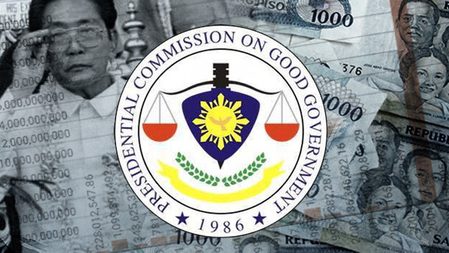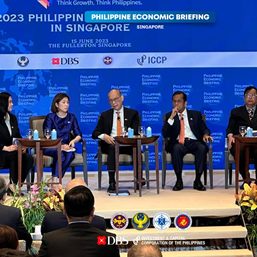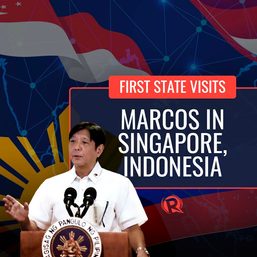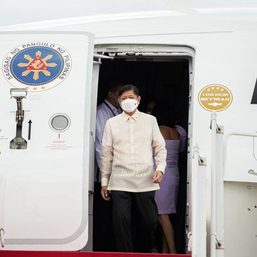SUMMARY
This is AI generated summarization, which may have errors. For context, always refer to the full article.

MANILA, Philippines – On September 6 to 7, Philippine President Ferdinand Marcos Jr. conducted a state visit to Singapore, meeting his counterpart head of government, Prime Minister Lee Hsien Loong.
Both Marcos and Lee are sons of men who once held the positions they hold now. Around three to four decades ago, it was Marcos’ late father, Ferdinand Marcos, and Singapore’s founding father Lee Kuan Yew who were in office.
In 1974, the older Lee conducted a state visit to the Philippines, and described the country’s first couple as gracious hosts.
But the first prime minister of Singapore began to change his views towards the Marcos family, particularly after the assassination of former senator Benigno “Ninoy” Aquino Jr., according to an Esquire article, citing Lee.
What did Prime Minister Lee’s father think about the administration of President Marcos’ dad? Here are some thoughts the late Lee Kuan Yew shared in his legacy book, From Third World to First: The Singapore Story: 1965-2000.
The Philippines was ‘pillaged’
Only in the Philippines could a leader like Ferdinand Marcos, who pillaged his country for over 20 years, still be considered for a national burial. Insignificant amounts of the loot have been recovered, yet his wife and children were allowed to return and engage in politics.
Lee kuan yew in his book, ‘From Third World to First: The Singapore Story: 1965-2000′
Lee was explaining his thoughts on why the Philippines was not as successful even if it had talented professionals and artists who were as good as Singaporeans, and sometimes even better, according to him. He said the Filipinos had a “soft, forgiving culture.”
As of 2020, the Philippine government has recovered at least P174.2 billion in ill-gotten wealth from the first Marcos administration. Reports have also emerged of the Marcos family’s unpaid estate tax that has potentially ballooned to P203 billion.
Marcos Jr. has his own conviction of not paying income taxes while he was vice governor and later governor of Ilocos Norte from 1982 to 1985.
In his memoir, Lee recalled a time he met with former US vice president Walter Mondale and compared notes on Indonesian strongman president Suharto. Lee said Mondale asked him, “You knew Marcos. Was he a hero or a crook? How does Suharto compare to Marcos?”
“I answered that Marcos might have started off as a hero, but ended up as a crook,” Lee wrote.
“Suharto never contemplated exile. The fortunes he and his family had were invested in Indonesia… Unlike Marcos of the Philippines, Suharto did not spirit his wealth outside his country in readiness for a quick exit. He remained in Jakarta,” Lee wrote.
Marcos and his family fled the Philippines towards the United States following the People Power Revolution in 1986 that toppled the first family from power.
Lee also did not believe the Marcoses would be able to pay back a loan they asked for following the assassination of Aquino in 1983. After Aquino was killed, international outrage ensued, resulting in foreign banks’ hesitation to give loans to the Philippines.
“[President Marcos] sent his minister for trade and industry, Bobby Ongpin, to ask me for a loan of US$300-500 million to meet the interest payments. I looked him straight in the eye and said, ‘Will never see that money back,’” he wrote.
“Moreover, I added, everyone knew that Marcos was seriously ill and under constant medication for a wasting disease. What was needed was a strong, healthy leader, and not more loans,” he added. (READ: When Ferdinand Marcos hid his illness from Filipinos)
The Philippines struggled to pay back its foreign loans in the 1980s. While Aquino’s assassination did not cause the financial crisis, the killing focused attention on it and sparked “broader public involvement and more explicit political action,” Harvard researcher William Overholt wrote in an Asian Survey article.
In November 2021, former chief justice Maria Lourdes Sereno quoted Lee’s writings in a Facebook post titled “Lessons ng Singapore para sa mga Pilipino (Lessons from Singapore for Filipinos).”
“Matapos ang People Power Revolution, umasa si Lee Kuan Yew na makakaahon muli ang Pilipinas sa tulong ng sumunod na pangulo na si Corazon Aquino. Ngunit habang lumilipas ang panahon, ang hindi mabilang na banta ng kudeta sa Pilipinas ay lalong pinasama ang investment reputation ng bansa,” said Sereno.
(After the People Power Revolution, Lee Kuan Yew hoped the Philippines would bounce back with the help of succeeding president Corazon Aquino. But countless threats of coups in the Philippines made the country’s investment reputation worse over time.)
“Bilib si Lee Kuan Yew sa individual talents ng mga Pinoy, ngunit hindi siya bilib sa political choices nila, gaya ng pag-accommodate muli sa mga Marcos. Gusto po ba nating hangaan tayo at igalang bilang isang bansa sa Singapore? Then, let’s take the lessons of history seriously,” she added.
(Lee Kuan Yew believed in the Filipinos’ individual talents, but not in their political choices, just like how they accommodated the Marcoses again. Do we want to be admired and respected by Singapore? Then, let’s take the lessons of history seriously.) – Rappler.com
Add a comment
How does this make you feel?

![[ANALYSIS] Marcos in Never, Neverland](https://www.rappler.com/tachyon/2022/09/tl-marcos-never-neverland.jpg?fit=449%2C449)
![[OPINION] Controversy over ASEAN’s ‘Swift’ week](https://www.rappler.com/tachyon/2024/03/tl-asean-swift-week.jpg?resize=257%2C257&crop=357px%2C0px%2C720px%2C720px)



There are no comments yet. Add your comment to start the conversation.